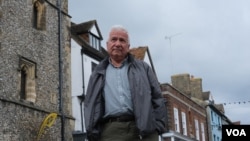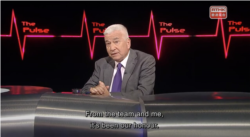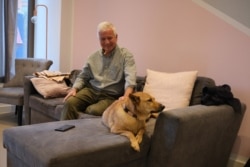Veteran journalist Steve Vines is still adjusting after his sudden departure from Hong Kong, the city he called home for more than half his life.
Vines left in July, just before a new immigration law came into effect that allows authorities to stop people arriving or departing.
The new ruling, along with changes at RTHK — the public broadcaster where Vines worked — and the experiences of staff at pro-democracy newspaper Apple Daily, influenced the 71-year-old journalist’s decision.
“I thought why, if you've made the decision to leave, why add the additional risk,” he said during an interview with VOA in St. Albans, the British town where he and several other former Hong Kong residents have resettled.
Two shows
For the past two decades, Vines hosted RTHK’s longest-running English-language current affairs program, “The Pulse,” and a morning talk show.
But when the national security law was brought in as part of efforts to bring stability after anti-government protests in 2019, it set off a series of changes to the media sector and civil society.
At least 100 people have been arrested under the law, including media tycoon Jimmy Lai and at least six executives and journalists from his Apple Daily. The company was forced to close in June after its assets were frozen.
Other journalists have spoken of a chilling effect from the law, and some have said the regulation is impacting RTHK.
Vines, a former president of Hong Kong’s Foreign Correspondents’ Club and a journalist known for being outspoken on his shows, said things changed so fast that he decided to resign.
“The space for practicing journalism in Hong Kong is reducing by the day. And if I can't do my job, I would prefer not to do it at all,” Vines said.
His daily show, “Morning Brew,” was one of several popular broadcasts dropped for alleged bias, along with other changes that have taken place since Patrick Li was appointed RTHK director this year.
Staff and media analysts have criticized the changes, including shows being cut, contracts for some journalists being terminated, Hong Kong’s Chief Executive Carrie Lam being given her own TV segment, and a partnership being made with Chinese state media.
Pressure from above
Li brought in a layer of people to censor programs, Vines said. He added that people who produced his show were facing pressure from top management, who did not like that he was expressing opinions on the program.
"I'm happy to cause problems for myself because I take responsibility for that. But, you know, I did feel that it was putting them in a difficult situation,” Vines said.
"It's not the way to conduct a proper broadcasting organization. These should be places where there is a free exchange of views, where you don't have to look over your shoulder every time you suggest something, where you don't make a program on the basis of what is politically acceptable, as opposed to what is most likely to inform and entertain the viewers or the listeners,” he said.
“The purpose of RTHK as a public broadcaster has more or less ceased to exist,” Vines said.
RTHK’s communications department said it “cannot accept the unfounded accusations” against the broadcaster.
In an email to VOA, the Hong Kong broadcaster said that all its programs must comply with RTHK’s charter and regulations on impartial, unbiased content, and by Hong Kong’s laws.
Anonymous threats
Vines said that when he announced the date for his last show, managers “went into a complete frenzy,” including making sure he would not wear any colors associated with the protest movement.
Vines had wanted to sign off using American broadcaster Edward R. Murrow’s famous line, “Goodnight and good luck.” But he said it was cut from the segment.
Most reporters and producers who worked on “The Pulse” have quit, Vines said.
Another factor in Vines’ decision was anonymous threatening calls he had been receiving, in which people on the other end of the line would tell the journalist to control his remarks.
His name also appeared on a list being shared on messaging apps that was said to include people likely to be targeted under the national security law. Several lists have been circulated since the law’s passage, with little way to tell if they are authentic.
The threats, coupled with the arrests of Apple Daily journalists including Fung Wai-kwong under the law, made Vines feel uncomfortable.
Fung, a commentator and chief editorial writer at Apple Daily, was arrested at the airport on June 27 as he tried to leave for Britain. He is accused of colluding with foreign forces.
The incident scared Vines, who has also written columns for Apple Daily.
Golden age
Vines first went to Hong Kong in 1987, intending to stay for only a few years. But he soon became attached to his new home city.
He recalled how on June 5, 1989, a million people marched peacefully in Hong Kong, protesting the crackdown on protesters in Beijing’s Tiananmen Square the day before.
“That was the day that so many things that I've been told about Hong Kong turned out to be complete and utter rubbish — [that] Hong Kongers only care about themselves, they are only interested in making money,” Vines said.
There was something in the air, a spirit of opportunity. “I said to myself, ‘Goodness me, who wouldn't want to live in a place like that?’ ” Vines said.
When he announced his departure, Vines said, several people told him it was the right decision.
But after three decades in Hong Kong, it has been hard to adapt to life in Britain.
Vines and his partner were looking for a place where they could still be close to Hong Kong friends and decent Chinese food. Vines said he regularly hears Cantonese being spoken in his new neighborhood, which makes him happy.
So far, the ones adapting best are the couple’s two dogs, which prefer the wide, flat parks in Britain to their old home in Sai Kung district.
But Vines misses Hong Kong’s atmosphere and the “wonderful, vibrant society,” that he said was being destroyed by the day.
“What I suppose I'm missing is something that was, not something that is. But I still miss it,” Vines said. “If the situation politically changes in Hong Kong, I'm on that plane going back.”
This article originated in VOA’s Cantonese Service.







